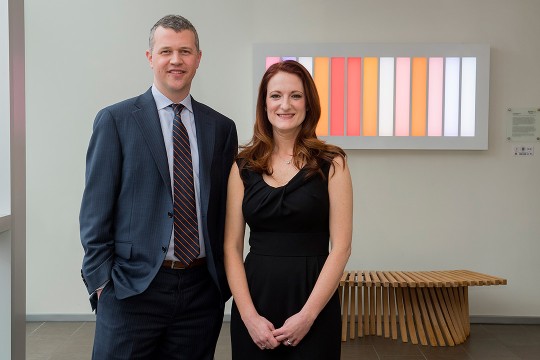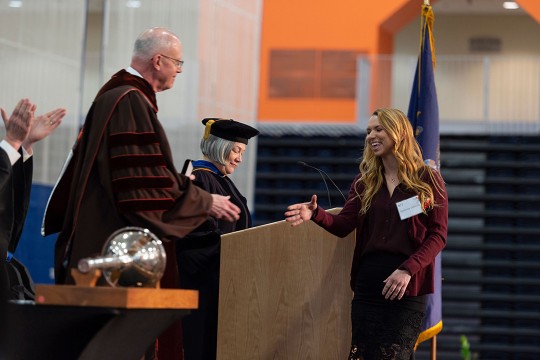News
-
April 19, 2019
![Woman performs on stage with large frog mascot.]()
RIT/NTID hosts ‘Signing Time’ free family concert May 3
Rachel Coleman, musician and star of the popular PBS and video series Signing Time, will perform a free show at NTID on May 3. Joining her on stage will be Coleman’s daughter Leah, an industrial design major at RIT/NTID, and her show sidekick Hopkins the Frog.
-
April 18, 2019
![logo for RIT intersections: the RIT podcast.]()
Podcast: The Case for the Performing Arts
Intersections: The RIT Podcast, Ep. 13: What role do the performing arts play in the life of students at a university noted for its science and technology? An enormous and welcoming role, say David Munnell, director of theater arts, and Thomas Warfield, director of dance at RIT’s National Technical Institute for the Deaf.
-
April 12, 2019
![Group of 14 people holding awards and smiling.]()
RIT honors researchers
RIT honored researchers who served as principal investigators on active awards in fiscal year 2018 at an April 11 reception. Also recognized were the 20 recipients of Seed Funding Awards and 12 new inductees in RIT’s PI Millionaires.
-
April 8, 2019
![Two people pull cloak off of plaque.]()
Celebrating 50 years of deaf education at NTID
NTID celebrated 50 years since the establishment of the world’s first technological college for deaf students with a rededication ceremony April 5. Attendees included members of the original faculty and class of NTID students from 1968 and Lucinda Robb, granddaughter of the late President Lyndon B. Johnson. In 1965, President Johnson signed Public Law 89-36, allowing for the creation of NTID. The rededication marks the first time that a relative of President Johnson has visited the campus since Lady Bird Johnson visited in 1974.
-
April 5, 2019
![Woman stands next to black-and-white photo of Lady Bird Johnson.]()
RIT/NTID celebrates 50 years of deaf education with Lyndon B. Johnson's granddaughter
WXXI reports on NTID's anniversary celebration.
-
April 4, 2019
![Man in blue suit and woman in black dress stand next to each other.]()
No longer lost in translation: Videos depicting complex scientific concepts break barriers for deaf STEM students
Research has revealed that people who learn English as a second language, including deaf and hard-of-hearing individuals, are underrepresented in STEM fields because of academic language abilities required to compete in those disciplines. A new project at NTID is helping to break down those obstacles specifically for deaf and hard-of-hearing people.
-
April 2, 2019
![Overhead view of sitting crowd listening to presenters.]()
Winners announced for RIT/NTID Next Big Idea entrepreneurship competition
DiwaTech, an interface design solution to improve video game accessibility, took home the $5,000 first prize during The Next Big Idea business competition, hosted by NTID.
-
April 1, 2019
![Student reaches out to skae President Munson's hand while walking across a stage.]()
Top academic achievers honored as RIT Outstanding Undergraduate Scholars
More than 100 RIT students were honored Thursday as Outstanding Undergraduate Scholars. The students were also able to invite the high school or community college teacher that made the most impact on their education.
-
March 21, 2019
![Baseball player from the 1950s with text: NTID Performing Arts presents the Pulitzer Prize-winner African American play "Fences"]()
RIT’s NTID Performing Arts presents August Wilson’s ‘Fences,’ April 11-14
Fences, the American play written by August Wilson, will be presented next month by the Performing Arts department of RIT’s National Technical Institute for the Deaf. Shows will run at 7:30 p.m. April 11-13, and 2 p.m. April 14, in Panara Theatre, Lyndon Baines Johnson Hall, on the RIT campus.
-
March 21, 2019
![Illustration of famous women dressed in purple with text that reads: Change the narrative. Women on Wikipedia. RIT Libraries]()
RIT Libraries hosts Women on Wikipedia Edit-a-thon March 22
Women are the subject of less than 30 percent of biographies on Wikipedia, and RIT Libraries is seeking the community’s help to improve gender equity on the internet’s leading source of information.
-
March 18, 2019
![Man in suit poses in atrium]()
RIT & NTID focusing on STEM careers for the deaf and hard of hearing
WXXI talks to NTID President Gerry Buckley about NTID’s $1.65 million grant from the National Science Foundation .
-
March 18, 2019
![Outside of brick building with glass entryway and cube scultpure, taken at dusk.]()
RIT/NTID to expand education and training through DeafTEC Resource Center
The National Science Foundation has awarded $1.65 million to DeafTEC: Technological Education Center for Deaf and Hard-of-Hearing Students, which will be used to transition the program into a resource center. The goal of the DeafTEC Resource Center is to increase the number of deaf and hard-of-hearing individuals in highly skilled technician jobs in which there continues to be underrepresentation and underutilization of such individuals in the workplace.











